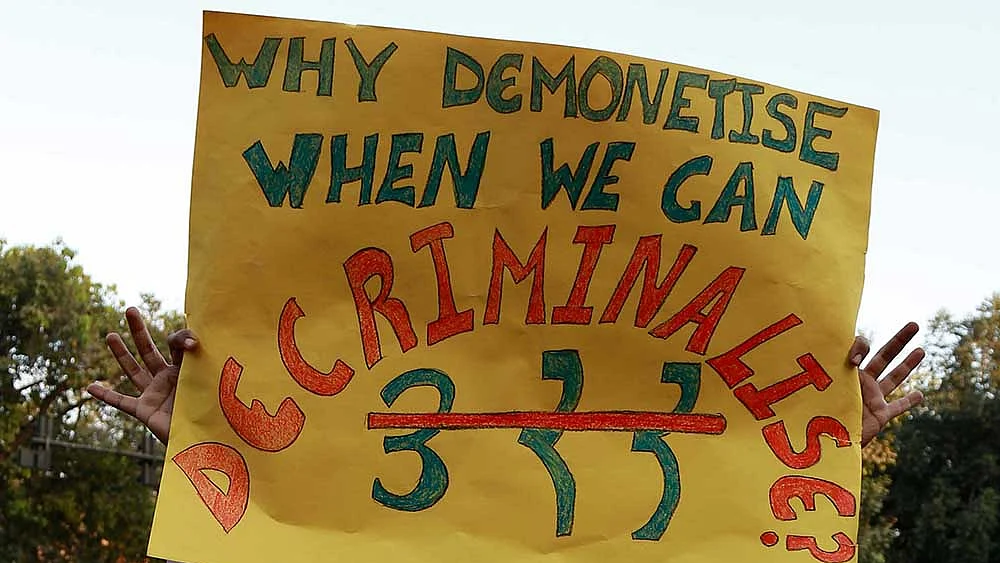India
Section 377 case: SC refuses to entertain bigotry dressed as arguments
The third day of the Section 377 hearing in the Supreme Court saw pointed arguments from lawyers arguing for decriminalisation and horrific hate speech masquerading as submissions from respondents

Several writ petitions filed by LGBT persons challenging the constitutionality of Section 377 IPC are currently being heard by a five-judge Constitution bench in the Supreme Court of India. Section 377 of the Indian Penal Code criminalises same sex relations, regardless of consent, and effectively criminalises homosexuality. In 2009, the Delhi High Court in Naz Foundation vs Union of India decriminalised consensual same sex relations under Section 377. In 2013, the Supreme Court in Suresh Kumar Koushal vs Naz Foundation reinstated criminalisation under Section 377. Now in 2018, in Navtej Johar vs Union of India and other writ petitions, LGBT petitioners are once again seeking decriminalisation of consensual same sex relations. Their lawyers have been submitting to the apex court that Section 377 violates several Fundamental Rights guaranteed by the Constitution. On Thursday, July 12, it was the turn for the respondents—supporters of Section 377—to argue. An eyewitness account follows of their submissions to the court and some of their exchanges with the judges.
The third day of the Section 377 Constitution Bench hearing on July 12 was a mix of pointed arguments from the lawyers arguing for decriminalisation of consensual same sex relations under Section 377, and horrific hate speech masquerading as submissions from the respondents who finally began their arguments.
As with the 2012 hearings in Suresh Kumar Koushal vs Naz Foundation in the Supreme Court, there was little substance in what the supporters of Section 377 actually had to say. However, unlike the 2012 hearings, the judges did not allow these digressions to go on for long.
“How can we promote bestiality” began one lawyer, to which he was swiftly cut off by Justice Rohinton F Nariman—“Nobody has argued for bestiality!”.
Another lawyer launched into a monologue on what parts of the body were reproductive and should be used for sex, only to have Chief Justice Dipak Misra curtly respond—“That’s not the issue”.
Yet another said the case required public consultation, to which he was reminded by the CJI that the court does not follow public morality, it is instead guided by constitutional morality; not the changing whims and fancies of public opinion, but instead values rooted in the Constitution.
Published: undefined
Yet another lawyer for a respondent supporting Section 377 said the case required public consultation, to which he was reminded by CJI Dipak Misra that the court does not follow public morality, it is instead guided by constitutional morality; not the changing whims and fancies of public opinion, but instead values rooted in the Constitution
The reason the Section 377 Constitution Bench has been giving a generous hearing to the petitioners is the same reason it has come down so hard on the respondents.
As the Chief Justice repeatedly reminded the court, this is a matter of constitutional law, the arguments submitted before the Court have to be rooted in constitutional law.
We have lawyers on our side basing their arguments on a combination of constitutional rights discourse, comparative and international law, along with decades worth of testimonies and painstakingly collated research reports.
On the other side, there are lawyers who would like the Court to please note that homosexuality is really only naturally found in the lower vertebrates.
Lengthy discussions into the sexual limits of the human anatomy were a matter that the judges in Koushal in 2012 were more than happy to hear about and prolong. This Constitution Bench however? It’s here to do its job.
Published: undefined
Queer rights lawyer Danish Sheikh is observing the court proceedings in writ petitions challenging the constitutionality of Section 377 IPC, currently being heard by a Supreme Court Constitution bench
Published: undefined
Also Read
Menaka Guruswamy: LGBT Indians deserve protection of their court, their constitution, their country
Live Blog: Day 1 of Supreme Court Constitution Bench hearings on Section 377
Live Blog: Day 2 of Supreme Court Constitution Bench hearings on Section 377
Live Blog: Day 3 of Supreme Court Constitution Bench hearings on Section 377
Published: undefined
Follow us on: Facebook, Twitter, Google News, Instagram
Join our official telegram channel (@nationalherald) and stay updated with the latest headlines
Published: undefined